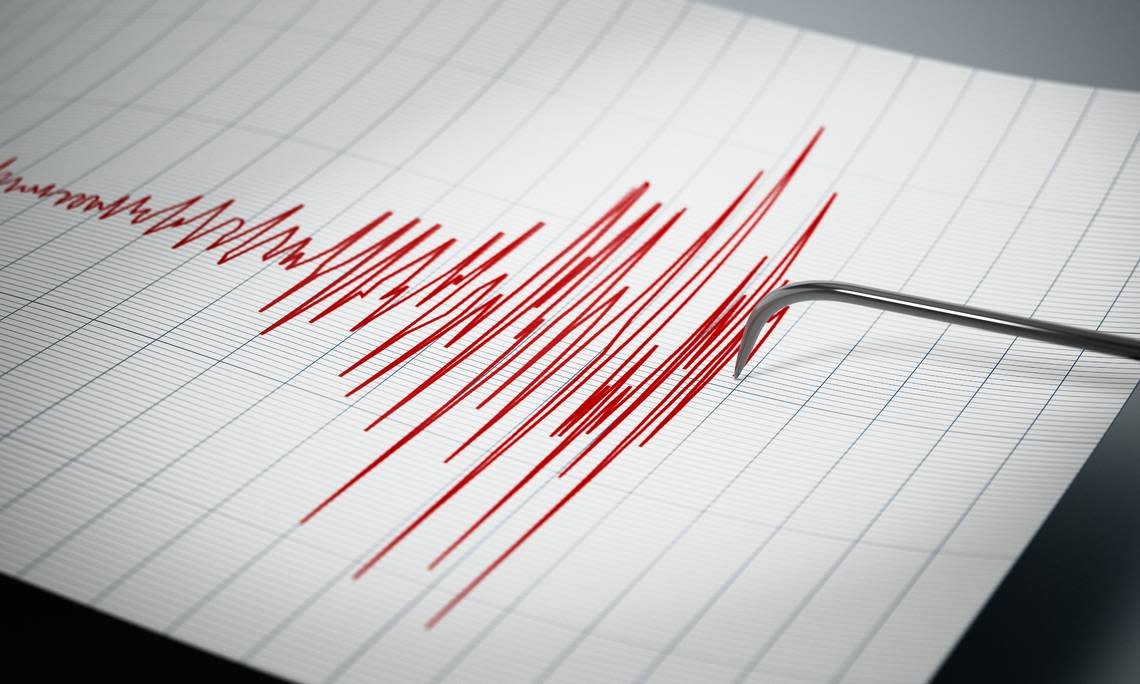Two earthquakes — 4.2 and 4.4 magnitude — shake Northern California, seismologists say

A pair of earthquakes with magnitudes of 4.2 and 4.4 shook Northern California, the U.S. Geological Survey reported.
The first and smaller quake was 3.3 miles deep and hit 3.7 miles from Belden at 6:34 p.m. Thursday, April 4, according to the USGS.
At least 664 people from as far away as San Francisco and Dayton, Nevada, reported feeling the tremor to the agency.
Within 24 seconds, the 4.4-magnitude hit in the same area. This quake was 4.8 miles deep, and felt by hundreds of more people, according to the agency.
At least 1,717 people reported feeling the second quake from as far as Santa Cruz and Reno, Nevada.
No significant damage or injuries were reported following the quakes, the California Governor’s Office of Emergency Services posted on X, formerly known as Twitter.
Belden is a census-designated place in Plumas County.
On social media, people reported feeling the shaking as far away as Sacramento.
“I was doing my taxes,” Reddit user wisemonkey101 wrote. “I thought it was an anxiety attack.“
“My building was shaking. Crazy!” Reddit user kings_account wrote. “Felt like my bed was a boat.”
Some baseball fans also had thoughts on the earthquake, which happened the same day the Oakland A’s announced the team will relocate to West Sacramento’s Sutter Health Park, The Sacramento Bee reported.
The team will share a ballpark with the Triple-A Sacramento River Cats for about three seasons, and some fans aren’t happy about the decision.
““Thunder, lightning, rain, hail and an earthquake in Sacramento today,’” an X user identified as Coliseum Sewage wrote. Baseball gods are mad.”
In the first 12 hours since Sacramento got in bed with John Fisher and @DaveKaval:
- thunder, lightning, HAIL in Sacramento
- Kings blow a 21-point lead during their playoff push
- earthquake just north of Sac
3 years of Fisher and Kaval might actually burn down the city https://t.co/8pniC7OZA3— Kalan K. Birnie (@kalankbirnie) April 5, 2024
What to know about earthquakes
Magnitude measures the energy released at the source of the earthquake, the U.S. Geological Survey says. It replaces the old Richter scale.
Quakes between 2.5 and 5.4 magnitude are often felt but rarely cause much damage, according to Michigan Tech. Quakes below 2.5 magnitude are seldom felt by most people.
Earthquakes’ sudden, rapid shaking can cause fires, tsunamis, landslides or avalanches. They can happen anywhere, but they’re most common in Alaska, California, Hawaii, Oregon, Puerto Rico and Washington, according to the Department of Homeland Security.
If an earthquake strikes, it’s best to protect yourself right away. Here are tips from experts:
If you’re in a car: Pull over and stop. Set your parking brake.
If you’re in bed: Turn face-down and cover your head with a pillow.
If you’re outdoors: Stay away from buildings. Don’t go inside.
If you’re inside: Stay and don’t run outdoors. Stay away from doorways.
The best way to protect yourself during an earthquake is to drop, cover and hold on, officials say.
“Wherever you are, drop down to your hands and knees and hold onto something sturdy,” officials say. “If you’re using a wheelchair or walker with a seat, make sure your wheels are locked and remain seated until the shaking stops.”
Be sure to cover your head and neck with your arms, and crawl under a sturdy table if possible. If no shelter is available, crawl to an interior wall away from windows.
Once under a table, officials say you should hold on with one hand and be ready to move with it.
“There can be serious hazards after an earthquake, such as damage to the building, leaking gas and water lines, or downed power lines,” officials say. “Expect aftershocks to follow the main shock of an earthquake. Be ready to Drop, Cover, and Hold On if you feel an aftershock.”
California service journalism assistant editor/reporter Sarah Linn contributed to this story
4.8-magnitude earthquake rattles New York City, northeast US, geologists say
Witnesses report shaking as NC town gets 2 earthquakes within 45 minutes, USGS says

